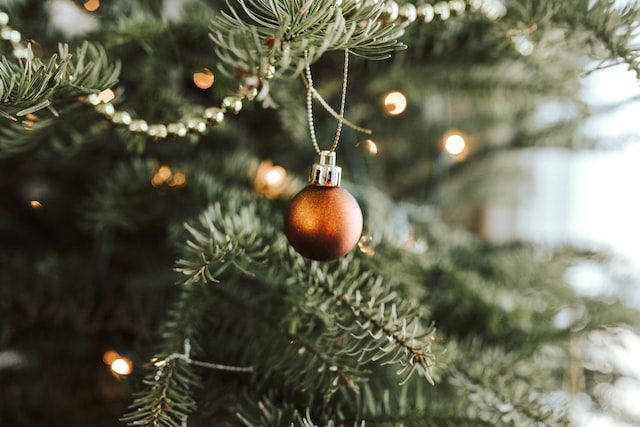What Covid Did to Christmas Coupledom
In the years prior to 2020, I developed a theory that the best way to prevent the onset of malaise (and/or resignation to the “work, sleep, work… until you die” expectation of our culture) was to create things to look forward to. Covid robbed us of many of these things. Historically, I’ve found that travel and concerts are what I look forward to most. Covid did away with both. Even the backup options: going to the movies, reuniting with a friend, blowing off steam at the gym, etc. were rendered at best risky and at worst impossible.
We celebrate Christmas because we live in a Christian-dominant culture. It’s widely believed that Christmas takes place in December not because Jesus was born in December (in fact, it’s unlikely that he was), but because the church hoped for the celebration to gain popularity by coinciding (and eventually all but replacing) the pagan winter solstice festivals.
What’s the point of this historical rambling? The intent of the winter holiday season is to distract from seasonal affective disorder (appropriately abbreviated SAD). We’re meant to look forward to the holidays and get caught up in their cheer. All the lights and trees and songs and eggnog distract us from the stubborn nights and biting cold.
I’ve always been terrible with disappointment… and 2020 gave the word a whole new meaning. For most of us, 2020 has relentlessly bombarded us with one disappointment after another: rejections from the jobs we thought we’d get, canceled trips and events, pathetic stimulus payments, you name it. We’ve all tried our best to keep our heads up, our smiles wide however strained. The warm months offered some relief, with outdoor dining and long strolls. Then autumn came and went, and the SAD-inducing winter crept up. We know to expect the cold.

What’s new are the limitations on cheerful activities. Not only are we suffering, but we are also suffering without the solace of having something to look forward to. Ice skating and carriage rides, reunions with family, caroling, and ski trips have all been halted by Covid rearing its ugly head. Even with the development of the vaccine, the daily and seasonal pleasures of years gone remain out of reach.
The holiday season may offer some comfort, despite overwhelming changes to our ways of life. On Halloween, I made sure my costume would be appreciated via photographs since I couldn’t go to bars. On Thanksgiving, I Facetimed the faraway relatives with whom I would usually share a table. The holiday season commenced and I did not grieve the loss of Black Friday. The bells still ring, our favorite films and specials still reel on TV, the fireplace blazes on, even if we might find fewer loved ones at our hearths. Though it might be painful, humans can adjust.

My boyfriend of over a year and I graduated from our two-year MFA program in May. By then, our plans to travel over the summer and find jobs in a new city were squashed. Like many 20-somethings, we decided to retreat to our parents’ homes to recalibrate and ride out the pandemic.
Our parents live over 500 miles apart. The drive from one to the other takes eight hours at best. The arrangement is among my year’s unplanned disappointments. I wanted to be in a long-distance relationship even less than I wanted to live with my parents. I didn’t hide this unhappiness from my partner. He assured me that we would see each other often, that crashing in my parents’ house wouldn’t be as jarring a transition as I anticipated, and that the time would go by faster than I thought.
We managed to establish a bi-weekly meet-up schedule. Six months went by like a blur of pages, though some days felt longer and more painstaking than others. The Fourth of the July banners came down and the Christmas wreaths went up, it seemed.
After we spent Thanksgiving apart, I asked him to come down the weekend before Christmas. I hoped to share some of the romance of the holiday season. He asked me to make the drive up for his birthday in early December. The request seemed a fair one. He certainly has done more driving than me these past few months. I got tested and made the long drive. At the end of the visit, I asked when I could expect to see him again before the new year. He seemed surprised and launched into an explanation about his work week leading up to Christmas. His job demanded him that weekend and through Christmas Eve. Even if he got time off, it’d only be for a couple of days—if that—and flights started at $350.
My daydreams of listening to my carefully curated Christmas playlist while driving through light displays, kissing under the mistletoe, constructing neighboring gingerbread houses, and sitting by the fireplace—all in matching pajamas— began to fade. I felt angry, and cheated, but I couldn’t ask him to blow off work and pay $350 for a flight during the time of Covid. The few days of Christmas coupledom that I’d set as the figurative star atop my tree of expectations had to come down. I had nothing to replace it with.

We can’t have it all this year. In fact, my boyfriend and I have had more days apart than we have had together. Perhaps I thought that coming together to celebrate Christmas could distract from the loneliness that has inhabited so much of the rest of the year. Ironically, Christmas couldn’t save me from the disappointments of the year, no matter how loudly I play “All I Want for Christmas is You.” This year my fantasies couldn’t come to be. I’d like to say that I’m without bitterness, but in truth, it is something I have to reconcile with myself (perhaps with the help of sugar cookies and a spiked seltzer Advent calendar). My boyfriend and I will load up on gifts for one another, relish our long phone calls, and look forward to the holidays to come. There’s always New Year’s.
